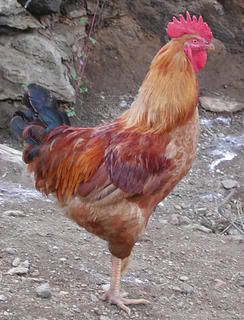I decided to investigate.

And I found this interesting tidbit of information from an anonymous user on the now (it seems) defunct http://www.qeok.com/:
"Rooster meat is by far tougher than hen's meat, but it is edible. It's the hormones in the meat that makes the difference. Just like with beef, for instance. A yearling steer (Castrated male, castrated while young) makes the best beef available. Cow meat isn't nearly as nice, and is often sold as 'budget' beef. It's still fairly edible, but has a little different flavour and is a little tougher, because of the estrogen that goes through their system. And bull meat is quite tough and stringy, and has a very strong flavour to it, because of the testosterone in it. Hope this helps!"
So great steak is from Mars, shitty flank is from Venus.
It never occurred to me that male muscle and female muscle would have different tastes and consistencies. If hormones have such an impact on the structure of our meat, do they also affect the structure of our brains? Of course, hormones affect the chemical composition of our brains - they affect emotion. But is the actual architecure of neural tissue different for men and women?
Would a male human taste different than a female human?
**
Some interesting rooster facts (courtesy of Wikipedia):
- A rooster pecks with the force of 15 pounds
- Castrated roosters are called "capons." They're tastier than other chickens because they grow more slowly and accumulate more fat.
- The Dutch translation of "cock-a-doodle-doo" is "kukeleku"
- Chicken feet are popular in Chinese cuisine

2 comments:
Coq au vin - (French: "rooster with wine") is a French fricassee of rooster cooked with wine, lardons, mushrooms, and garlic. Older roosters are traditionally used because they contain a lot of connective tissue, which creates a richer broth when cooked. I learned this on Top Chef last week. tv is educational.
Awesome!
Post a Comment